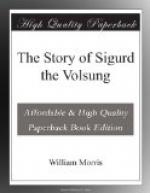And the Burg of the Niblung people and the heart of their warfaring.”
There were many men about him, and the wind in the wall-nook sang,
And the spears of the Niblungs glittered, and the swords in the forecourt
rang.
But they looked on his face in the even, and they hushed their voices and
gazed,
For fear and great desire the hearts of men amazed.
Now cometh an earl to King Giuki as he
sits in godlike wise
With his sons, the Kings of battle, and
his wife of the glittering eyes,
And the King cries out at his coming to
tell why the watch-horns blew;
But the earl saith: “Lord of
the people, choose now what thou wilt do;
For here is a strange new-comer, and he
saith, to thee alone
Will he tell of his name and his kindred,
and the deeds that his hand hath
done.”
* * * * *
Then uprose the King of the Niblungs,
and was clad in purple and pall,
And his sheathed sword lay in his hand,
as he gat him adown the hall,
And abroad through the Niblung doorway;
and a mighty man he was,
And wise and ancient of days: so
there by the earls doth he pass,
And beholdeth the King on the war-steed
and looketh up in his face:
But Sigurd smileth upon him in the Niblungs’
fenced place,
As the King saith: “Gold-bestrider,
who into our garth wouldst ride,
Wilt thou tell thy name to a King, who
biddeth thee here abide
And have all good at our hands? for unto
the Niblungs’ home
And the heart of a war-fain people from
the weary road are ye come;
And I am Giuki the King: so now if
thou nam’st thee a God,
Look not to see me tremble; for I know
of such that have trod
Unfeared in the Burg of the Niblungs;
nor worser, nor better at all
May fare the folk of the Gods than the
Kings in Giuki’s hall;
So I bid thee abide in my house, and when
many days are o’er,
Thou shalt tell us at last of thine errand,
if thou bear us peace or war.”
Then all rejoiced at his word till the
swords on the bucklers rang,
And adown from the red-gold Treasure the
Son of Sigmund sprang,
And he took the hand of Giuki, and kissed
him soft and sweet,
And spake: “Hail, ancient of
days! for thou biddest me things most meet,
And thou knowest the good from the evil:
few days are over and gone
Since my father was old in the world ere
the deed of my making was won;
But Sigmund the Volsung he was, full ripe
of years and of fame;
And I, who have never beheld him, am Sigurd
called of name;
Too young in the world am I waxen that
a tale thereof should be told,
And yet have I slain the Serpent, and
gotten the Ancient Gold,
And broken the bonds of the weary, and
ridden the Wavering Fire.
But short is mine errand to tell, and
the end of my desire:
For peace I bear unto thee, and to all




